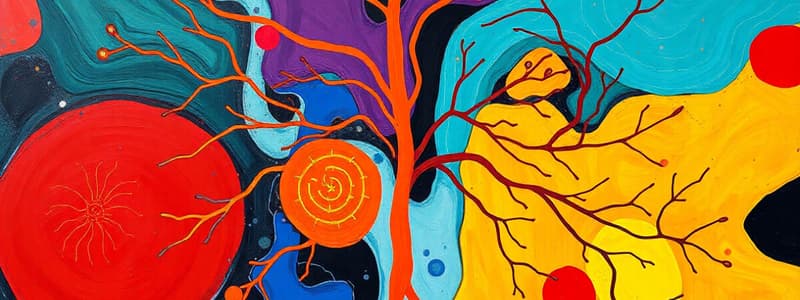Podcast
Questions and Answers
What is the primary role of the lymphatic system in fluid balance?
What is the primary role of the lymphatic system in fluid balance?
- To regulate blood pressure through vasoconstriction
- To collect and transport excess interstitial fluid to the blood (correct)
- To distribute proteins directly to blood capillaries
- To absorb nutrients from the digestive tract
What are chylomicrons and where are they primarily absorbed?
What are chylomicrons and where are they primarily absorbed?
- They are proteins absorbed in the lymph nodes.
- They are triglyceride-rich lipoproteins absorbed in the large intestine.
- They are triglyceride-rich lipoproteins absorbed in the small intestine. (correct)
- They are waste products absorbed in the liver.
What is the name of the fluid that is transported within lacteals?
What is the name of the fluid that is transported within lacteals?
- Interstitial fluid
- Chyle (correct)
- Lymph
- Serum
How is lymph primarily moved through lymphatic vessels?
How is lymph primarily moved through lymphatic vessels?
Which structural component aids in the rhythmic movement of lymph in larger lymphatic vessels?
Which structural component aids in the rhythmic movement of lymph in larger lymphatic vessels?
What is the primary function of the lymphatic system?
What is the primary function of the lymphatic system?
Which of the following best describes lymphatic capillaries?
Which of the following best describes lymphatic capillaries?
Where do interstitial fluids first enter the lymphatic system?
Where do interstitial fluids first enter the lymphatic system?
What role do the valves in lymphatic capillaries play?
What role do the valves in lymphatic capillaries play?
Which lymphoid organ is primarily responsible for producing lymphocytes?
Which lymphoid organ is primarily responsible for producing lymphocytes?
What happens to lipids that are absorbed from food in the digestive system?
What happens to lipids that are absorbed from food in the digestive system?
How do lymphatic endothelial cells prevent outward leakage of lymph?
How do lymphatic endothelial cells prevent outward leakage of lymph?
What aids in pulling the overlapping lymphatic endothelial cells apart?
What aids in pulling the overlapping lymphatic endothelial cells apart?
What structure do lymphatic capillaries merge to form?
What structure do lymphatic capillaries merge to form?
What prevents the backflow of lymph in collecting vessels?
What prevents the backflow of lymph in collecting vessels?
Which lymphatic duct drains lymph from the right arm, right side of the head, and thorax?
Which lymphatic duct drains lymph from the right arm, right side of the head, and thorax?
Which lymphatic structure collects lymph from various regions of the body before returning it to the cardiovascular system?
Which lymphatic structure collects lymph from various regions of the body before returning it to the cardiovascular system?
What is a consequence of less fluid reentering the capillaries compared to what leaves?
What is a consequence of less fluid reentering the capillaries compared to what leaves?
What significant role do lymph nodes play in the lymphatic system?
What significant role do lymph nodes play in the lymphatic system?
What typically happens to fluid that leaks into the interstitial space from blood vessels?
What typically happens to fluid that leaks into the interstitial space from blood vessels?
Which of the following is true about the thoracic duct?
Which of the following is true about the thoracic duct?
Flashcards are hidden until you start studying
Study Notes
Lymphatic System
- The lymphatic system consists of lymphoid organs, lymphatic vessels, and lymph.
- Lymphoid organs include red bone marrow, thymus, spleen, and lymph nodes.
- Lymphoid organs are integral to immune defense and produce lymphocytes.
- The lymphatic system functions to collect and return excess interstitial fluid and proteins to the blood.
- It also transports lipids absorbed from the digestive system to the blood.
- Lymphatic vessels carry lymph in one direction, from tissues to the heart.
- Lymphatic capillaries are blind-ended vessels that collect interstitial fluid, proteins, and pathogens.
- Lymphatic capillaries have overlapping endothelial cells with flaplike valves to facilitate fluid entry and prevent backflow.
- Lymph capillaries merge to form collecting vessels with valves that prevent backflow.
- Collecting vessels deliver lymph to lymph nodes.
- Lymphatic trunks are formed by the merging of collecting vessels.
- Lymphatic trunks drain into either the right lymphatic duct or the thoracic duct.
- The right lymphatic duct drains lymph from the right arm, right head, and right thorax.
- The thoracic duct drains lymph from all other body regions.
- Both lymphatic ducts empty into veins near the heart, returning lymph to the blood.
- The lymphatic system relies on skeletal muscle contractions to propel lymph through vessels.
- Smooth muscle within larger lymphatic vessels also contributes to the movement of lymph.
- The lymphatic system plays a crucial role in maintaining fluid balance and transporting chylomicrons (lipid-rich lipoproteins).
- Lacteals are specialized lymphatic capillaries in the villi of the small intestine that absorb chylomicrons.
- Chyle is the fluid within lacteals, eventually becoming part of the lymph transported by the lymphatic system.
Studying That Suits You
Use AI to generate personalized quizzes and flashcards to suit your learning preferences.




